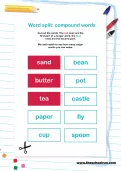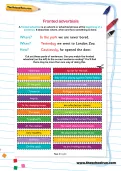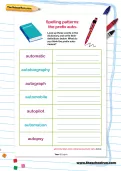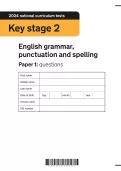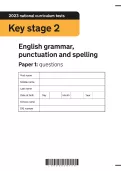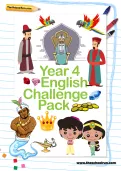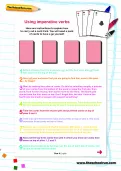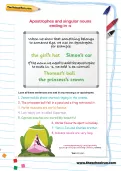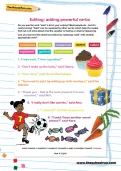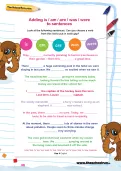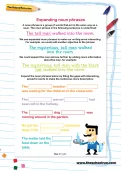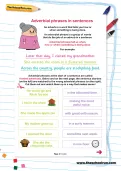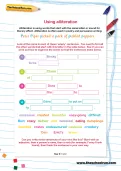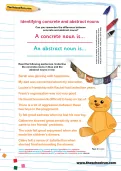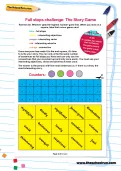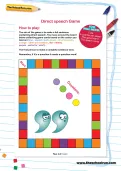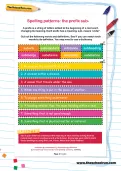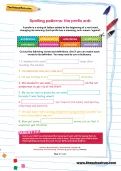Help your child prepare for the Year 6 English SATs, taken at the end of Key Stage 2, with some revision and at-home practice. These KS2 SATs past papers from 2024 are the official past papers from the Department for Education, used in schools.
or
Register to add to your saved resources
Help your child prepare for the Year 6 English SATs, taken at the end of Key Stage 2, with some revision and at-home practice. These KS2 SATs past papers from 2023 are the official past papers from the Department for Education, used in schools.
or
Register to add to your saved resources
Challenging reading comprehensions and spelling activities for KS2 (Year 4) readers and writers, designed to stretch your child and offer them the opportunity to explore their year-group topics in greater depth.
or
Register to add to your saved resources
Already a subscriber? to view this content.
Learn a card trick to amaze friends and family and practise identifying and using imperative verbs in this Y4 activity worksheet.
or
Register to add to your saved resources
When a noun we want to add an apostrophe to ends in -s we add 's to show possession, according to the national curriculum. Practise the rule by punctuating some sentences.
or
Register to add to your saved resources
Already a subscriber? to view this content.
Can you improve the sentences below by replacing “said” with another appropriate verb?
or
Register to add to your saved resources
Already a subscriber? to view this content.
In the following passage from The Tale of Tom Kitten by Beatrix Potter, can you replace the nouns (in bold) with any pronouns?
or
Register to add to your saved resources
Look at the following sentences. Can you choose a verb from this list to put in each gap?
or
Register to add to your saved resources
Already a subscriber? to view this content.
A collective noun is a noun used to refer to a group of things. For each green collective noun below, there are two purple nouns that could go with them. Can you cut out all the cards and match them up?
or
Register to add to your saved resources
Already a subscriber? to view this content.
A noun phrase is a group of words that act in the same way as a noun. Expand these noun phrases by filling the gaps with interesting, powerful words to make the sentences more descriptive.
or
Register to add to your saved resources
Already a subscriber? to view this content.
Adverbial phrases at the start of a sentence are called fronted adverbials. Cut out these sentence starters and see if you can match them with the correct adverbial phrases.
or
Register to add to your saved resources
Already a subscriber? to view this content.
Alliteration is the repetition of an initial letter or sound in closely connected words. Cut out the words in the table and sort them so that they are in groups according to their first letter. Now see if you can work out where they go in these sentences.
or
Register to add to your saved resources
Already a subscriber? to view this content.
Use these groups of words to write three of your own active sentences. Then use these words to write three of your own passive sentences.
or
Register to add to your saved resources
Already a subscriber? to view this content.
Most sentences have a subject (the thing or person the sentence is about), a verb (a doing word) and an object (something that is having something done to it by the subject). Can you find appropriate subjects, verbs and objects in the table below to fill in these sentence gaps? Then underline the subject in green, the verb in purple and the object in orange.
or
Register to add to your saved resources
Already a subscriber? to view this content.
Read the following sentences. Underline the concrete nouns in blue and the abstract nouns in red.
or
Register to add to your saved resources
Already a subscriber? to view this content.
A Year 4 English worksheet created by an experienced teacher to help your child understand active and passive voice, with examples.
or
Register to add to your saved resources
Already a subscriber? to view this content.
Each player collects parts of sentences as they go round the board then, when you get to the end, see who can write the best story using just the parts you've collected.
or
Register to add to your saved resources
Already a subscriber? to view this content.
The aim of the game is to make a full sentence containing direct speech. You move around the board collecting game cards based on the colour you land on. The first person to make a complete sentence wins.
or
Register to add to your saved resources
Already a subscriber? to view this content.
A prefix is a string of letters added to the beginning of a root word, changing its meaning. Each prefix has a meaning; sub- means ‘under’. Cut out the following words and definitions. See if you can match each words to its definition.
or
Register to add to your saved resources
Already a subscriber? to view this content.
A prefix is a string of letters added to the beginning of a root word, changing its meaning. Each prefix has a meaning; anti- means ‘against’. Cut out the following words and definitions. See if you can match each words to its definition.
or
Register to add to your saved resources
Already a subscriber? to view this content.
